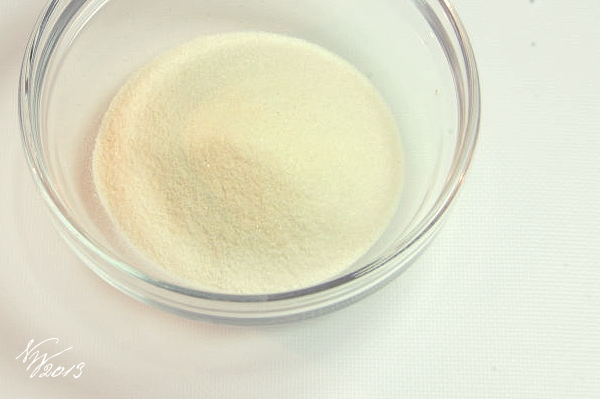 Gelatin is peptides and proteins extracted from collagen. Today, food-grade gelatin is produced mainly from beef skin and pork hide, but gelatin can also be rendered from bones, horns, hooves, and other connective tissues, and from other animals like chickens, fish, and horses.
Gelatin is peptides and proteins extracted from collagen. Today, food-grade gelatin is produced mainly from beef skin and pork hide, but gelatin can also be rendered from bones, horns, hooves, and other connective tissues, and from other animals like chickens, fish, and horses.
The gelatin used in the TCfeline premix is 100% from pork skin to eliminate any possible contamination with the infectious prion which causes BSE (Bovine spongiform encephalopathy), commonly know as “Mad Cow Disease”, which can also affect people and possibly even cats.
Dry gelatin is almost 99% protein, but low in essential amino acids, except for Arginine (~8%). Its function in the cat’s diet is, therefore, another than a dietary source of essential amino acids. Nutritionally speaking, it serves a source of energy, because the cat uses protein for maintaining blood glucose at all cost.
However, gelatin serves an important functional role in the diet as Hydrophilic (“water-loving”) Colloid or Hydrocolloid, allowing particles to stay dispersed within a liquid solution instead of separating. This function of gelatin has a direct benefit to the cat when food reaches the stomach. Instead of separating and layering into its components, the food mixture remains a homogenized mass. Gelatin absorbs the digestive secretions and facilitates an even infiltration of acidic gastric juices into the ingested food mass for an even digestion without causing stomach acids to concentrate merely around the food mass, which can delay the digestion process and gastric emptying and possibly irrigate the stomach. Personally, I have observed a marked reduction in the cases of food regurgitation in my cats when gelatin is a part of the diet.
Gelatin, as part of the diet, has also been indicated in the prevention and healing of stomach ulcers of various origins. Researchers from the Institute of Molecular Genetics, Russian Academy of Sciences, Faculty of Biology of the Lomonosov Moscow State University and the Shemiakin and Ovchinnikov Institute of Bioorganic Chemistry, Russian Academy of Sciences found that gelatin’s short peptides – glyprolines – consist of amino acids of glycine and proline – protect the stomach mucous tunic from injuries.
Gelatin has also been claimed to promote general joint health. A study at Ball State University sponsored by Nabisco, the former parent company of Knox gelatin, found that gelatin supplementation relieved knee joint pain and stiffness in athletes.
To some extent, gelatin mimics the skin and connective tissue of the cat’s natural prey diet.
